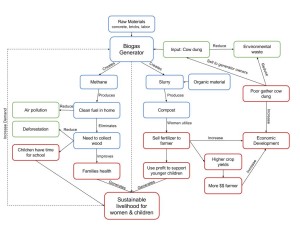The system diagram below represents the chain of effects that biogas generators have on the rural ecosystems in Bangladesh, India. The current problem people of this region face without a clean fuel alternative to wood burning is degradation of the land and health issues in young children and women. Biogas generators allow more time for children to go to school, improve living conditions and health, and create a compost product, which women utilize to generate income. The core ideas behind my diagram are the social, environmental, and economic factors that cooperate to transform biogas generator technology into sustainable livelihoods for women and children. I view an ecosystem as an interaction between the physical environment and human social system. Coupled human-environment systems show the impact of the relationships between the human social system and ecosystem.
Notice that the diagram is divided by color: blue (direct factors of biogas production) green (environmental effects), and red (social and economic benefits).Together the generator and women entrepreneurs reduce environmental waste, improve the lives of their children, and create a product that aids the farmers of rural areas.
Figure 1. Local impact of biogas generator in rural Bangladeshi, India.
 Compared to Marten’s diagram, this diagram has few similarities, but both pay attention to the environmental impact and demand for biogas generators. Marten’s diagram focuses on the larger social system while this diagram is specific to the livelihood of the individuals affected. There are similarities and difference between our diagram because we are concentrating on different scales. My diagram is a local scale while Marten’s focuses on a regional scale in India. It is important to compare diagrams to understand all the factors involved in systems. Each of us think critically about different elements of the system. By examining each diagram, we can learn a different point of view about the same system.
Compared to Marten’s diagram, this diagram has few similarities, but both pay attention to the environmental impact and demand for biogas generators. Marten’s diagram focuses on the larger social system while this diagram is specific to the livelihood of the individuals affected. There are similarities and difference between our diagram because we are concentrating on different scales. My diagram is a local scale while Marten’s focuses on a regional scale in India. It is important to compare diagrams to understand all the factors involved in systems. Each of us think critically about different elements of the system. By examining each diagram, we can learn a different point of view about the same system.
